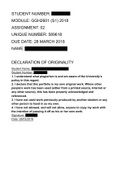STUDENT NUMBER: 60593695
MODULE: GGH2601 (S1) 2018
ASSIGNMENT: 02
UNIQUE NUMBER: 589618
DUE DATE: 28 MARCH 2018
NAME: MICHAELA MANICOM
DECLARATION OF ORIGINALITY
Student Name: Michaela Margaret Manicom
Student Number: 60593695
1. I understand what plagiarism is and am aware of the University’s
policy in this regard.
2. I declare that this portfolio is my own original work. Where other
people’s work has been used (either from a printed source, Internet or
any other source), this has been properly acknowledged and
referenced.
3. I have not used work previously produced by another student or any
other person to hand in as my own.
4. I have not allowed, and will not allow, anyone to copy my work with
the intention of passing it off as his or her own work.
Signature: M.M.M
Date: 28/03/2018
, The effects of climate change on population, food security, and
the environment in Africa and possible strategies that can be
implemented to mitigate these impacts.
INTRODUCTION
Climate change is the leading environmental crisis of our world today, and possibly the
root cause of almost all global issues such as politics, crime, famine and so forth. Yet we
still ask ourselves, what is climate change? There is no one existing factual definition, the
impacts are so broad it makes it difficult to narrow down. Climate change can be described
as the long-term changes in average weather conditions covering all changes in the
climate system, including the drivers of change, the change themselves and their effects
(Mannak 2008). Climate change no longer occurs at a natural, steady rate. Humans have
accelerated the process to a point where the natural world cannot keep up. The
greenhouse effect is a natural process enabled to sustain life on Earth. The atmosphere
traps long-wave radiation which the surface of the earth reflects once receiving energy
from the sun, in order to keep the planet warm. The biosphere is unable to absorb the
rapidly increasing amounts of excess carbon dioxide, resulting in vast, negative changes in
our climate. The western world are almost entirely responsible for climate change, yet it is
the poor that suffer the most.
IMPACT ON FOOD SECURITY
Food security is achieved when people have constant access to a reliable and nutritious
food supply (Mannak 2008). To ensure food security, the surrounding environment, water
sources and soils need to be of good quality and available in substantial amounts.
Therefore, affordable and accessible food can be provided to a nation. Many people in
developed or high-developing countries are aware of food shortages, increasing prices
and scarce resources - but do they truly understand how majority of the world are fighting
for food security daily? In 2011, Somalia experienced a devastating drought that took the
lives of over 250 000 people due to famine, over 50% were under the age of five, while
another drought surfaced in November 2016 and after three months, 135 000 people were
displaced (UNHCR 2017). The extreme weather events that occur due to a changing
climate such as heat waves, floods, droughts and storms have the ability to wipe out entire
crop fields. Not only does this has a direct impact on food availability to locals, but a major
loss in commercial crops can have a detrimental effect on a nations economy through
product scarcity and sky-high prices.





